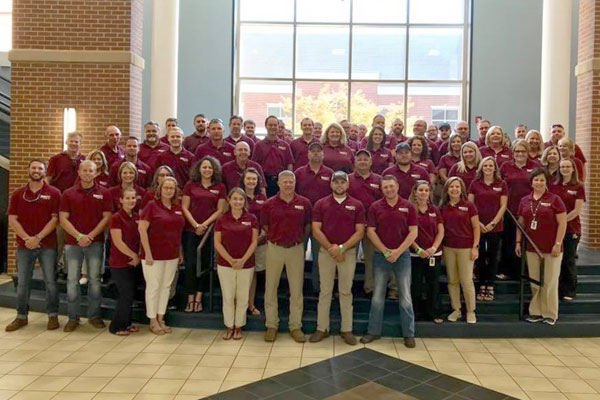Warren Rural Electric Cooperative Corporation (Warren RECC) was formed in 1938 to bring electricity to rural areas of South Central Kentucky. We began with 325 members in Warren, Edmonson, and Simpson Counties. Today, we serve over 75,000 members across Barren, Butler, Edmonson, Grayson, Logan, Ohio, Simpson, and Warren Counties, making us the 10th largest local power company (LPC) in the Tennessee Valley Authority (TVA) region. We are also the largest TVA provider in Kentucky. Warren RECC employs 160 people in four local offices and our Bowling Green corporate headquarters.
Warren RECC was created locally by people who wanted to make a difference in their community. Today, we’re still run locally, and we still have a heart for the communities we serve. While we have grown tremendously and look forward to continued growth, you can count on the same personal and professional service you have come to expect from Warren RECC.
What is a cooperative?
A cooperative (co-op) is a business or organization owned by and operated for the benefit of its members. More often than not, co-ops – including Warren RECC – are locally owned and run. That means there are no shareholders or far away parent companies. Warren RECC is owned by those we serve.
With their shared ownership, cooperatives serve their members’ needs democratically. Each member has a vote in board elections, establishing a greater degree of mutual responsibility and accountability than in investor-owned companies.
What are the 7 Cooperative Principles?
Cooperative businesses can be found in many industries. REI, Land O’Lakes, Navy Federal Credit Union, and many others are all examples of the cooperative business model in action. At their foundation are seven guiding principles.
Warren RECC was founded on these very principles and today they continue to guide us in our decisions.
- Voluntary and Open Membership — Cooperatives are voluntary organizations, open to all persons able to use their services and willing to accept the responsibilities of membership, without gender, social, racial, political, or religious discrimination.
- Democratic Member Control — Cooperatives are democratic organizations controlled by their members, who actively participate in setting policies and making decisions. The elected representatives are accountable to the membership. In primary cooperatives, members have equal voting rights (one member, one vote) and cooperatives at other levels are organized in a democratic manner.
- Members’ Economic Participation — Members contribute equitably to, and democratically control, the capital of their cooperative. At least part of that capital is usually the common property of the cooperative. Members allocate surplus capital for specific purposes like developing the cooperative business or electric system, possibly by setting up reserves. Supporting other activities like community improvement or education projects is also permitted with the approval by the membership through the board of directors.
- Autonomy and Independence — Cooperatives are autonomous, self-help organizations controlled by their members. If they enter into agreements with other organizations, including governments, or raise capital from external sources, they do so on terms that ensure democratic control by their members and maintain their cooperative autonomy.
- Education, Training, and Information — Cooperatives provide education and training for their members, elected representatives, managers, and employees so they can contribute effectively to the development of their cooperatives. They inform the general public, particularly young people and opinion leaders, about the nature and benefits of cooperation.
- Cooperation Among Cooperatives — Cooperatives serve their members most effectively and strengthen the cooperative movement by working together through local, national, regional, and international structures.
- Concern for Community — While focusing on member needs, cooperatives work for the sustainable development of their communities through policies accepted by their members.
For more information on each principle, read our President and CEO Dewayne McDonald’s perspective on how Warren RECC exemplifies each Cooperative Principle in our daily operations.
Related Agencies
Warren RECC is not only recognized as a leader in our community, but we also have a significant impact across the state and nation through related organizations. The organizations listed below are an example of the types of organizations we work with to fulfill our purpose and mission.
The Tennessee Valley Authority (TVA) is a federal agency created in 1933 to supply power and other services to the seven-state Tennessee Valley region. In addition to supplying power, TVA has regulatory powers in rate-making and other jurisdictional arrangements with the electrical distributors. TVA generates all power within the seven-state region and resells through 153 local power companies.
The National Rural Electric Cooperative Association (NRECA) is the national organization of 900+ electric cooperatives across the country. NRECA furnishes several services to the cooperatives, including federal legislative contacts, training seminars, member communication materials, insurance, and retirement programs.
Kentucky Electric Cooperatives is the state organization of the 26 electric cooperatives within the state of Kentucky. It furnishes various services to the cooperatives, including legislative contacts, publishes Kentucky Living Magazine, and coordinates other state activities.
The American Electric Cooperatives PAC, formerly known as ACRE, is the political action arm of NRECA and furnishes lobbying expertise on the national level. No corporate funds can be used to support the PAC. Members of the America’s Electric Cooperatives PAC range from those serving on the Board of Directors and senior leadership, to employees and cooperative members.

Want to know more? Visit our FAQ here!

